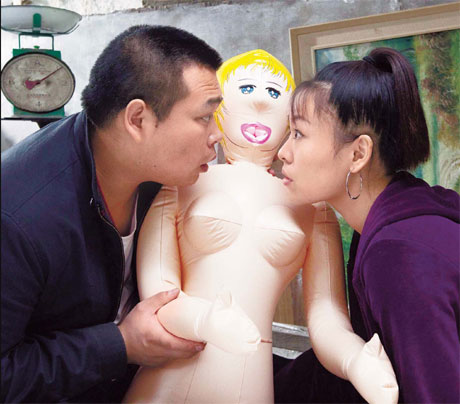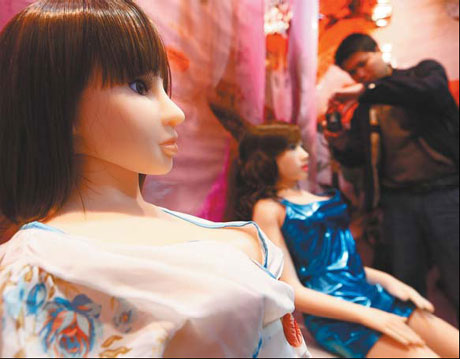Sex & the city
 |
|
A scene from the film, Red Light Revolution, that is set on a Beijing sex shop and takes a humorous look at Chinese tradition colliding with modern sexual values. Photos provided to China Daily |
 |
|
Exhibits on display at a Shanghai sex expo draw the attention of a visitor. Provided to China Daily |
Sam Voutas' festival film Red Light Revolution looks behind the red lights and into the sex shops. Kelly Chung Dawson reports.
Since China's first sex shop opened in 1993, over 2,000 similar stores have opened in Beijing alone. Attitudes toward sex in Chinese society and media have changed since then, but not that much, says Australian-born screenwriter and director Sam Voutas.
Promoting his 2010 film Red Light Revolution, which premiered in New York at the Friars Club Comedy Festival on Oct 16, Voutas speaks about the taboo of sex shops.
"I've lived in China on and off for over 15 years, and one of the biggest changes at the street level has been this sudden emergence of sex shops," he says. "Back when they first opened in the 90s, it was like going to the pharmacy, with the employees wearing clinical white coats! That's all really changed with the growth in the Chinese economy, because the entrepreneur has become a big part of city life. For many people, it's quite a risk-averse industry to enter; the cost is quite low and the returns are good."

Indeed, 70 percent of the world's sex toys are made in China; 10,000 sex toy companies are based in the country, and billions of condoms are made in China each year.
The number of feature films about China's sex toy and sex shop industry? One, according to Voutas. That film is Red Light Revolution, about a down-on-his-luck unemployed taxi driver who opens a sex shop in a Beijing hutong, or alley.
Shunzi (played by Zhao Jun), jobless and single, goes into business with a friend and along the way, is helped by a cast of characters familiar to those who have spent any time in the working-class areas of Beijing, Voutas says.
The film also stars Tess Liu (The Karate Kid), Vivid Wang, Tian Huimin (Mao's Last Dancer), Ji Qing (Gasp), Jiang Xiduo and Japanese actor Masanobu Otsuka (City of Life and Death).
Liu, who plays Shunzi's business partner and friend, grew up believing that sex shops were dirty and unsafe. To this day, she has never gone into one, she says with a laugh. In other interviews, Voutas has said that Liu did not tell her family about the subject matter of the film. The main characters in the movie also struggle with telling their loved ones about what business they are in.
For the movie, the filmmakers built a fake sex shop set, using "a truckload" of donated sex toys from a Chinese company in return for the free publicity the film would provide the products.
Even though public attitudes online and among the younger generation has changed quite a lot, sex is still not openly discussed in most movies, or in the media, Voutas says.
"It's definitely still a big taboo, both in the media and on a personal level," he says. "People go to sex shops at night time. But I think it's good to have sex shops whether that's in China or in the United States; it's very healthy. In China there's also a feeling that to have these shops keeps things in proper balance."
But on set, the props kept disappearing, he says with a laugh at the panel discussion following the screening in New York. In fact, sex toys and marital aids have been used in China since imperial times, he says.
In January, the film will have a theatrical release in the United Kingdom, and may go limited in Canada and Singapore, Voutas says. It has also played at other film festivals in the US. Voutas is currently in talks with the Chinese equivalents of YouTube, in the hope of having it released in China around the Lunar New Year, when viewer numbers are highest.
Working with his partner-producer Melanie Ansley and Chinese filmmaker Wang Yifan, on a limited budget, the film faces a stricter rating system than in Hollywood.
In China, films must be appropriate for all ages to screen in cinemas, so after struggling with the bureaucracy of the Chinese film industry (a subject that is handled with humor in the film) the movie was filmed without permits.
Although the comedy is Beijing-based, Voutas says that it was a conscious decision to give the film a Western tone.
"The storyline had a very Western type arc to it, and the jokes are quite Western as well," he says. "As for the music, we used independent bands from all around China who play rock 'n' roll."
The result is a film that will charm Western audiences, but Chinese audiences too will recognize a rapidly changing world of their own to giggle about.






















